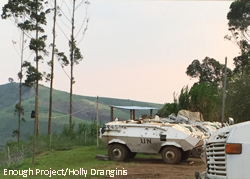
Late last week, the UN Group of Experts — a panel of investigators mandated by the UN Security Council with monitoring implementation of the arms embargo and sanctions in place on Congo and with providing public updates on the security situation in Congo — released its annual final report. As attention on Congo’s election crisis continues to rise, the Group’s latest 166-page report focuses on a range of security issues in the east, especially natural resource trafficking, the evolving nature of armed group activity, and grave violations of international law, including ongoing child soldier recruitment.
The group emphasized that several armed groups active in eastern Congo are involved in organized criminal networks, noting that interventions outside the scope of traditional military operations are needed to disrupt this trend. In particular, the report highlights organized crime related to profitable business enterprises like gold extortion and kidnapping for ransom, saying within these networks, “distinctions between armed groups, criminal networks and [Congolese army] elements can become blurred.”(para 102)
Kidnappings for ransom have been particularly rampant in Rutshuru, with members of the Nyatura and FDLR among most prominent perpetrators, according to the report. In some cases, according to the report, “Armed bands of some 5 to 10 men carried out the kidnappings and usually took the victims to Virunga National Park while they negotiated the ransom with family members, the community or an employer. Ransoms depended on the means of the victim, but usually ranged from $1,000 to $2,000.”(para 110)
The group noted significant gains in the security situation as it relates to the tin, tantalum and tungsten (3T) trades in eastern Congo, but cautioned that impunity for army commanders involved in 3T smuggling remains in tact, undermining genuine progress in the mining sector. The report also made critical mention of the lack of transparency mechanisms for gold in Congo. In the report’s summary, the group said,
“One particular area of concern is the lack of a functioning traceability system for gold. Gold from non-validated mining sites, and therefore possibly benefiting armed groups, is laundered into the legitimate supply chain and, subsequently, into the international market. Exporters based in the Democratic Republic of the Congo regularly buy gold without knowing its actual origin and some exporters significantly underdeclare the volumes exported, with discrepancies of at least $174 million in 2015.”(Introduction, p. 3)
To help combat ongoing gold trafficking and opaque, tainted gold supply chains and their links to violence against civilians, the Group offered some critical recommendations. In particular, it prescribed:
“…that the Governments of Burundi, Uganda and the United Arab Emirates report to the Committee twice a year on specific measures taken to stop gold exported illegally from the eastern Democratic Republic of the Congo from being trafficked and sold in their countries (see paras. 159-164 and 168 and annexes 51 and 53),” and “…that the Security Council consider revising the sanctions criteria in the forthcoming resolution with regard to the Security Council Committee established pursuant to resolution 1533 (2004) concerning the Democratic Republic of the Congo to include entities and individuals supporting armed groups or leaders and exacerbating State fragility through gold-related illicit financial flows or money laundering (see paras. 122-124).”
The Enough Project echoes both of these calls, which fall directly in line with our core advocacy on this topic, and urges the Security Council to adopt these measures during negotiations this week on a new Resolution, expected on June 23. The role of Uganda and the United Arab Emirates has been a consistent theme of Group reports for many years, and it is time that the Council took stronger measures in response.
Finally, though the group is mandated by UNSCR 2198 to report on “serious violations of international humanitarian law and human rights violations and abuses, including those within the security forces, in the DRC,” the report was nearly silent on gender-based violence. Human Rights Watch and other human rights groups have reported on rape committed by various armed groups in Congo in 2015 and early 2016, but there is only a single mention of gender-based violence in the Group’s 166-page report, which briefly notes that the Lord’s Resistance Army has perpetrated sexual slavery (para 73). The absence of reporting is a missed opportunity for information gathering and distribution and policy influence on a critical component of armed conflict and civilian security in the east.

